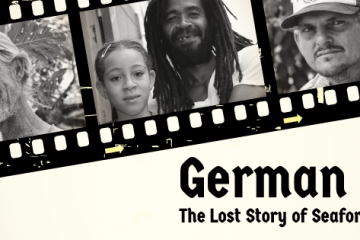German Town The Lost Story Of Seaford Town Jamaica
Check out this new trailer of an upcoming documentary about German heritage and history in Jamaica.
“German Town The Lost Story Of Seaford Town Jamaica” is a full length documentary that explores the history of German heritage and history within Westmoreland, Jamaica.
Deep within the isolated undeveloped mountains of Westmoreland lies a village with a history and people unique to Jamaica.
It is said that the inhabitants of this village are descendants of German indentured servants who were used to work the Jamaican plantations after the emancipation period to substitute the slave labor that drove the islands economy.
Others think they came under different circumstances as runaway prisoners, former military battered after the Napoleonic wars seeking a better life to escape poverty and hardships in their home lands.
This documentary project explores the history and contemporary life of Jamaicans of German heritage.
For more info contact- djjazzydave@juno.com
Directed by- David Ritter
Produced by- David Ritter and Clinton Wallace for photomundo international
Also by David Ritter The Forgotten Faces of Jamaica – A Documentary on Minority Groups in Jamaica



19 Comments
I just went to the screening in London and had a great time. A documentary that shakes up society. It is a shame this documentary is censored from Jamaican society and kept from the Jamaican public.
The world could benefit from more films like this.
Trying to find a family tree of the Hacker family in Seaford Town. Anyone? I see one post above from Nee-Hacker. contact me at laurenflynn4@gmail.com
Just wondering if you were able to determine why none of the German heritage or language was passed on
sherry
What a great documentary. I recommend it to anyone who is interested in German or Caribbean history and culture.
What a tornado of emotions this video brings out in people.
I suppose that is a good thing.
I love the film during the Q&A at the screening I attended we had many questions about heritage, race,and history.
One of my favorite parts is the little boy who wrote a poem about the Jamaican national motto.
The director David Ritter is a rude email stalker. If you negatively review his film he sends you hilarious yet unintelligent harassing emails to no end. The film is a home video at best with no story line. The trailer and the movie do not match up. I am a Jamaican German and I am disgusted at his film. It lacks cinematic honesty and overall effort. To top it all off he went on a racist tirade against black Jamaicans after one of his movie screenings that turned my stomach. Little did he know, his audience had a large number of Jamaican Germans in it that did not appreciate his nonsense. Since the director is from Haiti (a Hatian German) and he doesn’t want to research a culture well that he is portraying he should make films about what he knows–preferably his own culture.
I attended a screening of this documentary and met the filmmaker, David Ritter. For the life of me I cannot understand where all of this controversy comes from. The documentary was excellent and the filmmaker was very articulate and polite. The fact that such a simple piece of history inflames so many people shows that there is something seriously wrong within Jamaican society and many of its residents. If you haven’t taken the time to see this documentary, watch it. You may learn something!
My family stills lives in Seaford town-Although I was not born there(Canadian) I can tell you that the history from the original German immigrants was not a story carried through the years. There is a lot of fragmented stories. My family are from Jamaica and are proud of it. In all my years I have never heard any family member refer to themselves as German. There will always be people trying to figure out the real history behind these original immigrants but a lot is based on guessing as record keeping was not their strong suit back in the day. You will notice this in some of the older records all the incorrect spelling of names. Higher education was not prevalent back then. Hopefully all Jamaicans will not be insulted by the ignorance of so called historians.
To all my family still living in Seaford Town, If you are reading this-Much Love goes out to you.
I don’t think they knew they were going to be portrayed in the light they are being portrayed in. The Germans who still live in Seaford Town live peacefully with everyone. What they don’t say is that over 1/2 of the original Germans either migrated to the USA or killed themselves by hanging after seeing that what they were promised was not given to them. They knew nothing about living in the tropics and had to learn how to survive. There actually several German Towns in Jamaica but Seaford Town had the most families. I wish this person did not portray these residents in such a negative light. He doesn’t understand, Jamaicans.
Yes it does, and the oonuh was oonuh, but I will be glad to continue this discussion once I see the whole film.
The problem people have with his work is the way its presented. Everyone has a right to tell their stories. I am not sure how you got the idea that people in that thread thought otherwise. Also why is it necessary to state that you live in JA. Does that give you a bit more say and authority than Jamaicans living abroad? Seriously. I will agree with on:
“Oonun need to get over yourselves and deal with progress not the same misery…”
Good advice for the creator of this documentary and the people interviewed.
What i get from that thread on DHR is that a bunch of people (most of whom happen to live in farin by the way) are upset because the enslavement of black people was worse than indentured servitude, and therefore no one else must be able to tell their story and express their views.
I live in Jamaica, I find this story interesting, and I’ll reserve judgement on what position this documentary tries to put forward until I’ve actually seen the whole thing.
Oonun need to get over yourselves and deal with progress not the same misery…
Ahh. I see the undercover racist is still pushing his documentary hard. This guys agenda is simple to portray blacks as oppressor and racist in Jamaica and the rest of the caribbean. What a ting lawd. No one should take him and his documentary seriously.
Thanks Soul Rebel for your comment!
Clarification: Germans didn’t end up in Jamaica as indentured labourers because black Jamaicans didn’t want to work (as this documentary alleges). After 400 years of working for NOTHING, black Jamaicans refused to continue that practice as ‘free’ people – yes, they wanted to work, but not for “a little of nothing”.
The Germans and other groups were brought in after emancipation to displace the blacks, and whereas they were settled in the mountains, this was a ploy to force to the blacks who had also sought refuge there to relocate to the plains – closer to the sugar plantations where the owners hoped to continue exploiting their labour.